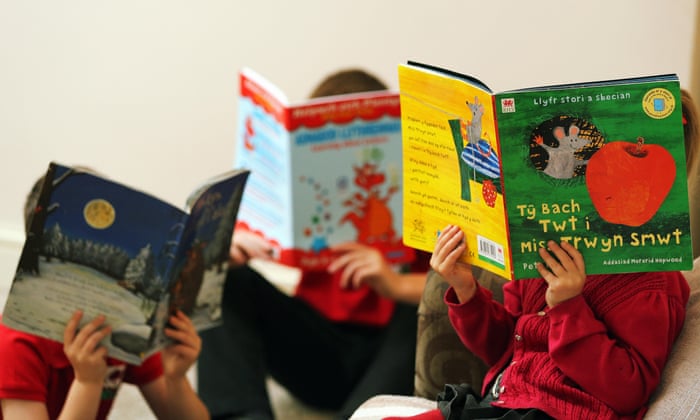
En poursuivant votre navigation sur ce site, vous acceptez l'utilisation de cookies. Ces derniers assurent le bon fonctionnement de nos services. En savoir plus.

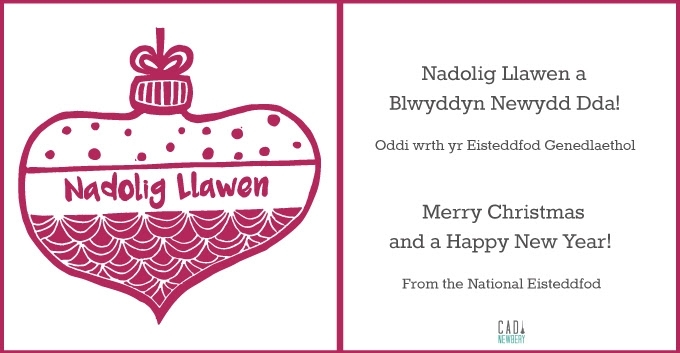
Despite news this week that sales had fallen dramatically, the Welsh Books Council’s chief says that the sector is showing real growth
The head of the Welsh Books Council (WBC) has hailed a “golden age for the Welsh-language novel” despite reports of a dramatic decline in sales.
BBC Cymru Fyw reported earlier this week that sales of Welsh-language children’s books through the WBC’s distribution centre had fallen by 16% to 196,000 in the six years to 2017, while sales of Welsh-language books for adults were also down, by 18% to 118,000. These figures come a year after the Welsh government backed down over proposed cuts to the WBC after hundreds of authors, including Philip Pullman and Sarah Waters, said it would have a “significant and deleterious impact” on Welsh literature.
But while WBC chief executive Helgard Krause admitted there had been a dramatic decline in children’s book sales, she said the “children’s books in question are basically Welsh-language text books commissioned by the Welsh government for schools – the world has changed, and a lot of these books are now commissioned in digital form and made available for free”.
Krause said that there had been a real increase in sales of novels and poetry in Welsh over the last few years, with annual novel sales rising from 19,980 in 2011/12 to 28,407 in 2015/16 – a 42% increase. “It is not unusual for a popular Welsh–language novel to sell 3,000 copies, which is pretty amazing for a language with 600,000 speakers … If you look at the number of Welsh speakers versus the population of Britain (65 million), it follows that 1,000 copies of the Welsh-language book equates to 100,000 of the English-language book,” she said, adding that last month had been the best October in five years for sales.
Krause cited titles including Ymbelydredd (Radiation) by Guto Dafydd, which won the Prose Medal at the 2016 National Eisteddfod and has sold more than 3,000 copies; Caryl Lewis’s Martha Jac a Sianco, a novel about three elderly siblings trapped by a life of hardship on a farm in rural Wales, which she said had sold more than 7,000 copies in Welsh; and Y Gân Olaf (The Final Song), the posthumously published final volume of poetry by Gerallt Lloyd Owen, which she said sold more than 1,600 copies.
Her comments were echoed by Welsh publishers and booksellers. Eirian James, at independent bookshop Palas Print in Caernarfon, said that its sales of books for adults in Welsh had increased steadily over the past four to five years.
“We are very aware that sales of books to schools and libraries have gone down significantly over the past five to six years. At the same time, sales in the shop - both books for children and adults in Welsh and in English - have continued to grow steadily and consistently,” she added.
At publisher Y Lolfa, Garmon Gruffudd agreed and said both the number of Welsh novels published and sold were on the rise. “Over the past five to 10 years, sales have been constant and this year we have seen an increase in the sales of Welsh-language printed books,” said Gruffudd.
According to Gruffudd, 15 years ago a Welsh novel would sell less than 500 copies, but now “there are dozens of mostly young writers with strong followings writing contemporary fiction” and selling between 1,000 and 4,000 copies of their books.
Aneirin Karadog, who has been shortlisted for the Wales book of the year prize for his poetry collection Bylchau, said: “In the drive to promote the use of the Welsh language, encouraging oral use and reading are two different fronts that don’t always help each other. Many Welsh speakers are comfortable using the language orally but when it comes to reading, because of dialects or attitudes, a more formal type of Welsh can be offputting to some.”
But he believes it is “critical that Welsh-language authors are encouraged to create books in Welsh and not to be slaves to translations of what is popular in the Anglo-American world. Welsh-language books have come a long way, especially for children and young people, but we can always do more.”
Welsh, or Cymraeg, is Karadog’s first language, and so “writing poetry in Welsh is as natural as breathing”. He has written in English, but “when in my natural element as a poet, I write in free verse and cynghanedd [a form of Welsh poetry] and this connects me to Aneirin and Taliesin of the sixth century. It places me in a poetic tradition I am proud to be able to continue,” he said.
Author Dyfed Edwards, who is bilingual, feels that Welsh authors “should be writing what people want to read … I know that sounds obvious, but I think sometimes in Wales – and in Welsh-language publishing – we maybe exist in an echo chamber. Most of the voices are very similar, the tone of the books published are similar – though, of course, there are exceptions. We write for the same readers, many of whom are our fellow writers. We need populist and popular novels and we need experimental and challenging novels,” he said. “We need Dan Browns, Cormac McCarthys, Stephen Kings, Nicholson Bakers in the Welsh language. We need Kane and Abel and we need Catch-22.”
Edwards speculated that “Welsh-language readers are mostly middle-class, educated, very much involved in ‘Welsh’ life. Maybe we should be focusing on developing [an audience] among the less traditional Welsh-speaking readership. That will certainly mean populist, genre novels, aimed at the young,” he said.
He also called for a push to translate more books from Welsh. “Look what that’s done for Scandinavian fiction. It would draw attention to the fact that we have a Welsh-language publishing industry, even among Welsh speakers who perhaps don’t buy Welsh-language books at the moment. I live in England, and often people ask me, ‘Are books published in Welsh?’ I doubt they’d ask the same of Norwegian or Finnish or Icelandic,” he said.
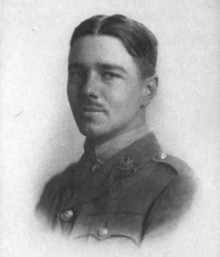
Wilfred Edward Salter Owen, MC (18 mars 1893 – 4 novembre 1918) est un poète anglais, très connu en Angleterre et parfois considéré comme le plus grand poète de la Première Guerre mondiale. Ses poèmes, souvent réalistes et décrivant la brutalité et l'horreur de la guerre de tranchées et des attaques au gaz, tranchent fortement avec l'opinion que le public porte sur la guerre à l'époque, et avec les vers patriotiques de célébrités telles que Thomas Hardy et George Meredith ou d'autres jeunes poètes combattants comme Rupert Brooke. Parmi ses poèmes les plus connus, on peut citer Dulce Et Decorum Est, Anthem for Doomed Youth, Futility et Strange Meeting. La poésie d'Owen a fortement été influencée par les conseils et l'exemple de son ami Siegfried Sassoon
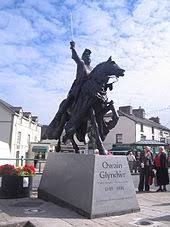
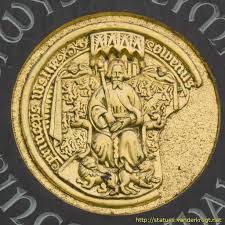
Gorsedd

Awen of Iolo Morganwg.
|
|
| Abbreviation | Gorsedd |
|---|---|
| Formation | 1792 |
| Founder | Iolo Morganwg |
| Type | Welsh culture Celtic Revival |
| Headquarters | Wales |
| Website | gorsedd.org |
A gorsedd /ˈɡɔːrsɛð/ plural gorseddau, is a community or coming together of modern-day bards. The word is of Welsh origin, meaning "throne". It is often spelled gorsedh in Cornwall and goursez in Brittany, reflecting the spellings in the Cornish and Breton languages, respectively.
When the term is used without qualification, it usually refers to the national Gorsedd of Wales, namely Gorsedd Beirdd Ynys Prydain,[1] meaning "The Gorsedd of Bards of the Island of Britain". However, other gorseddau exist, such as the Cornish Gorsedh Kernow[2] and the Breton Goursez Vreizh.[3]
Gorseddau exist to promote literary scholarship and the creation of poetry and music.[4] As part of this, their most visible activity can be seen at Eisteddfodau – Welsh language festivals.
Gorsedd Beirdd Ynys Prydain was founded in 1792 by Edward Williams, commonly known as Iolo Morganwg, who also invented much of its ritual, supposedly based on the activities of the ancient Celtic Druidry.[5] Nowadays, much of its ritual has Christian influence, and were given further embellishment in the 1930s by Archdruid Cynan (1950–1954).[citation needed] The Gorsedd y Beirdd made its first appearance at the Eisteddfod at the Ivy Bush Inn in Carmarthen in 1819, and its close association with the Festival has remained. It is an association of poets, writers, musicians, artists and individuals who have made a significant and distinguished contribution to Welsh language, literature, and culture.
The fictitious origin of these ceremonies was established by Professor G.J.Williams in works touching on Iolo Morgannwg.[6]
There are three ranks of membership in the Welsh Gorsedd. Until 2012 they were, in ascending order of honour:
However, since 2012 all these ranks are treated as equal, with new members all being called 'Druids' and with the colour of their robes reflecting the area of their contribution rather than an ascending order of honour. The head of a Gorsedd is known as an Archdderwydd (English: Archdruid), and wears a golden robe, and is elected for a term of three years, and is responsible for conducting the Gorsedd ceremonies during Eisteddfod week. These ceremonies are held to honour literary achievements amongst Welsh poets and prose writers. The ranks within the Breton Gorsedd (Goursez) are the same.
In the Cornish Gorsedd (Gorsedh Kernow), there is only one rank, that of bard, and all robes are blue.[8]
In the Welsh Gorsedd, a person may become an ovate or a bard by passing an examination in the Welsh language.[9] Druids may only be nominated by existing druids. Often a new inductee will take a pseudonym, called a "bardic name." To become an Archdruid, an individual must have won one of the Eisteddfod's three highest awards: the Crown, the Chair, or the Literature Medal. In 2003, Robyn Lewys (Robin Llŷn) became the first winner of the Literature Medal to be elected Archdruid, and the first Archdruid to be elected by a vote of all Gorseddogion. Christine James was the first woman to become Archdruid of Wales.
People are also made ovates or druids as an honour to reward their contributions to Welsh culture. In 1946, the future Queen Elizabeth II was inducted into the Welsh Gorsedd at the National Eisteddfod of Wales.[10] In recent years, Ron Davies,[11] Rowan Williams,[12] Matthew Rhys,[13] Ioan Gruffudd[14] and Rebecca Evans[15] have been honoured in this way.
Three Gorsedd ceremonies are held during the Eisteddfod week:
During these ceremonies, the Archdruid and the members of the Gorsedd gather on the Eisteddfod stage in their ceremonial robes. When the Archdruid reveals the identity of the winning poet, the 'Corn Gwlad' (a trumpet) calls the people together and the Gorsedd Prayer is chanted (the Corn Gwlad symbolically calls everyone from the four corners of Wales). The Archdruid partially withdraws a sword from its sheath three times, and cries "A oes heddwch?" ("Is there peace?"), to which the assembly reply "Heddwch" ("Peace"). The sword is then placed fully back into its sheath, and hence is never drawn fully. Then the Horn of Plenty is presented to the Archdruid by a young local married woman, who urges him to drink the 'wine of welcome'. A young girl presents him with a basket of 'flowers from the land and soil of Wales' and a floral dance is performed, based on a pattern of flower gathering from the fields.
The symbol commonly used to represent a Gorsedd is a triple line, the middle line upright and the outer two slanted towards the top of the centre, thus: /|.[16] This symbol, called "awen", is often explained as representing the sun.[8] The word "awen" means "muse" in Welsh.
| Look up gorsedd in Wiktionary, the free dictionary. |
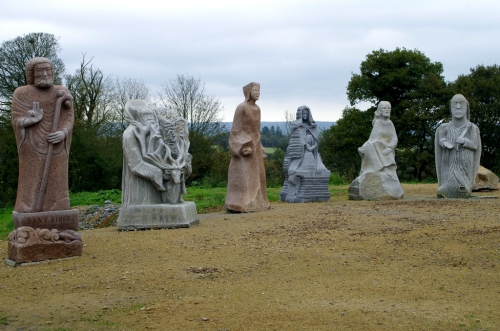
Vallée des Saints à Carnoët
Wales' population has risen by 14,100 to 3.113 million, according to the latest figures.
Office for National Statistics data, for June 2016, shows a 0.5% increase compared to 2015.
As a percentage, it is the lowest of the home nations and overall, the UK population rose by 538,000 to 65,648,000 with net migration accounting for 336,000, or 62.4%.
Since 2006, Wales' population has risen by 4.3%, again the lowest in the UK.
UK-wide, more births and fewer deaths made up 35.8% of the rise and 2016 saw the highest increase since 1947 when a surge of births after World War Two saw the population spike by 551,000.